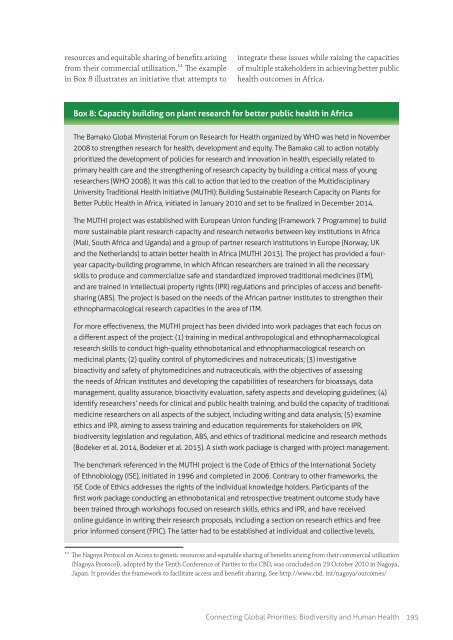Connecting Global Priorities Biodiversity and Human Health
1ZcgwtN
1ZcgwtN
Create successful ePaper yourself
Turn your PDF publications into a flip-book with our unique Google optimized e-Paper software.
esources <strong>and</strong> equitable sharing of benefits arising<br />
from their commercial utilization.¹¹ The example<br />
in Box 8 illustrates an initiative that attempts to<br />
integrate these issues while raising the capacities<br />
of multiple stakeholders in achieving better public<br />
health outcomes in Africa.<br />
Box 8: Capacity building on plant research for better public health in Africa<br />
The Bamako <strong>Global</strong> Ministerial Forum on Research for <strong>Health</strong> organized by WHO was held in November<br />
2008 to strengthen research for health, development <strong>and</strong> equity. The Bamako call to action notably<br />
prioritized the development of policies for research <strong>and</strong> innovation in health, especially related to<br />
primary health care <strong>and</strong> the strengthening of research capacity by building a critical mass of young<br />
researchers (WHO 2008). It was this call to action that led to the creation of the Multidisciplinary<br />
University Traditional <strong>Health</strong> Initiative (MUTHI): Building Sustainable Research Capacity on Plants for<br />
Better Public <strong>Health</strong> in Africa, initiated in anuary 2010 <strong>and</strong> set to be nalized in December 2014.<br />
The MUTHI project was established with European Union funding (Framework 7 Programme) to build<br />
more sustainable plant research capacity <strong>and</strong> research networks between key institutions in Africa<br />
(Mali, South Africa <strong>and</strong> Ug<strong>and</strong>a) <strong>and</strong> a group of partner research institutions in Europe (Norway, UK<br />
<strong>and</strong> the Netherl<strong>and</strong>s) to attain better health in Africa (MUTHI 2013). The project has provided a fouryear<br />
capacity-building programme, in which African researchers are trained in all the necessary<br />
skills to produce <strong>and</strong> commercialize safe <strong>and</strong> st<strong>and</strong>ardized improved traditional medicines (ITM),<br />
<strong>and</strong> are trained in intellectual property rights (IPR) regulations <strong>and</strong> principles of access <strong>and</strong> benetsharing<br />
(ABS). The project is based on the needs of the African partner institutes to strengthen their<br />
ethnopharmacological research capacities in the area of ITM.<br />
For more eectiveness, the MUTHI project has been divided into work packages that each focus on<br />
a dierent aspect of the project: (1) training in medical anthropological <strong>and</strong> ethnopharmacological<br />
research skills to conduct high-quality ethnobotanical <strong>and</strong> ethnopharmacological research on<br />
medicinal plants; (2) quality control of phytomedicines <strong>and</strong> nutraceuticals; (3) investigative<br />
bioactivity <strong>and</strong> safety of phytomedicines <strong>and</strong> nutraceuticals, with the objectives of assessing<br />
the needs of African institutes <strong>and</strong> developing the capabilities of researchers for bioassays, data<br />
management, quality assurance, bioactivity evaluation, safety aspects <strong>and</strong> developing guidelines; (4)<br />
identify researchers needs for clinical <strong>and</strong> public health training, <strong>and</strong> build the capacity of traditional<br />
medicine researchers on all aspects of the subject, including writing <strong>and</strong> data analysis; (5) examine<br />
ethics <strong>and</strong> IPR, aiming to assess training <strong>and</strong> education requirements for stakeholders on IPR,<br />
biodiversity legislation <strong>and</strong> regulation, ABS, <strong>and</strong> ethics of traditional medicine <strong>and</strong> research methods<br />
(Bodeker et al. 2014, Bodeker et al. 2015). A sixth work package is charged with project management.<br />
The benchmark referenced in the MUTHI project is the Code of Ethics of the International Society<br />
of Ethnobiology (ISE), initiated in 1996 <strong>and</strong> completed in 2006. Contrary to other frameworks, the<br />
ISE Code of Ethics addresses the rights of the individual knowledge holders. Participants of the<br />
rst work package conducting an ethnobotanical <strong>and</strong> retrospective treatment outcome study have<br />
been trained through workshops focused on research skills, ethics <strong>and</strong> IPR, <strong>and</strong> have received<br />
online guidance in writing their research proposals, including a section on research ethics <strong>and</strong> free<br />
prior informed consent (FPIC). The latter had to be established at individual <strong>and</strong> collective levels,<br />
¹¹ The Nagoya Protocol on Access to genetic resources <strong>and</strong> equitable sharing of benefits arising from their commercial utilization<br />
(Nagoya Protocol), adopted by the Tenth Conference of Parties to the CBD, was concluded on 29 October 2010 in Nagoya,<br />
Japan. It provides the framework to facilitate access <strong>and</strong> benefit sharing. See http://www.cbd. int/nagoya/outcomes/<br />
<strong>Connecting</strong> <strong>Global</strong> <strong>Priorities</strong>: <strong>Biodiversity</strong> <strong>and</strong> <strong>Human</strong> <strong>Health</strong><br />
195


